The Role of CSR in the UK Fashion Retail Sector Analysis
VerifiedAdded on 2023/01/07
|30
|11015
|85
Report
AI Summary
This report provides a comprehensive analysis of Corporate Social Responsibility (CSR) and stakeholder management within the UK fashion retail sector. It explores the significance of CSR, the interpretation of CSR within stakeholder management policies, and the comparison between large and small organizations' approaches. The research investigates how fashion retail companies innovate CSR and stakeholder policies to increase customer loyalty. The report also delves into the impact of CSR on consumer loyalty, ethical management, and sustainable practices in the industry, considering factors like pollution, working conditions, and animal welfare. The literature review incorporates various academic sources, including articles and reports from Mintel, Emerald, and other researchers. The study aims to understand the relationship between CSR, customer loyalty, and stakeholder engagement, providing valuable insights for both academics and industry practitioners. It also discusses the challenges and opportunities in the context of the fashion retail sector, including the impact of Brexit and the growing demand for eco-friendly products.
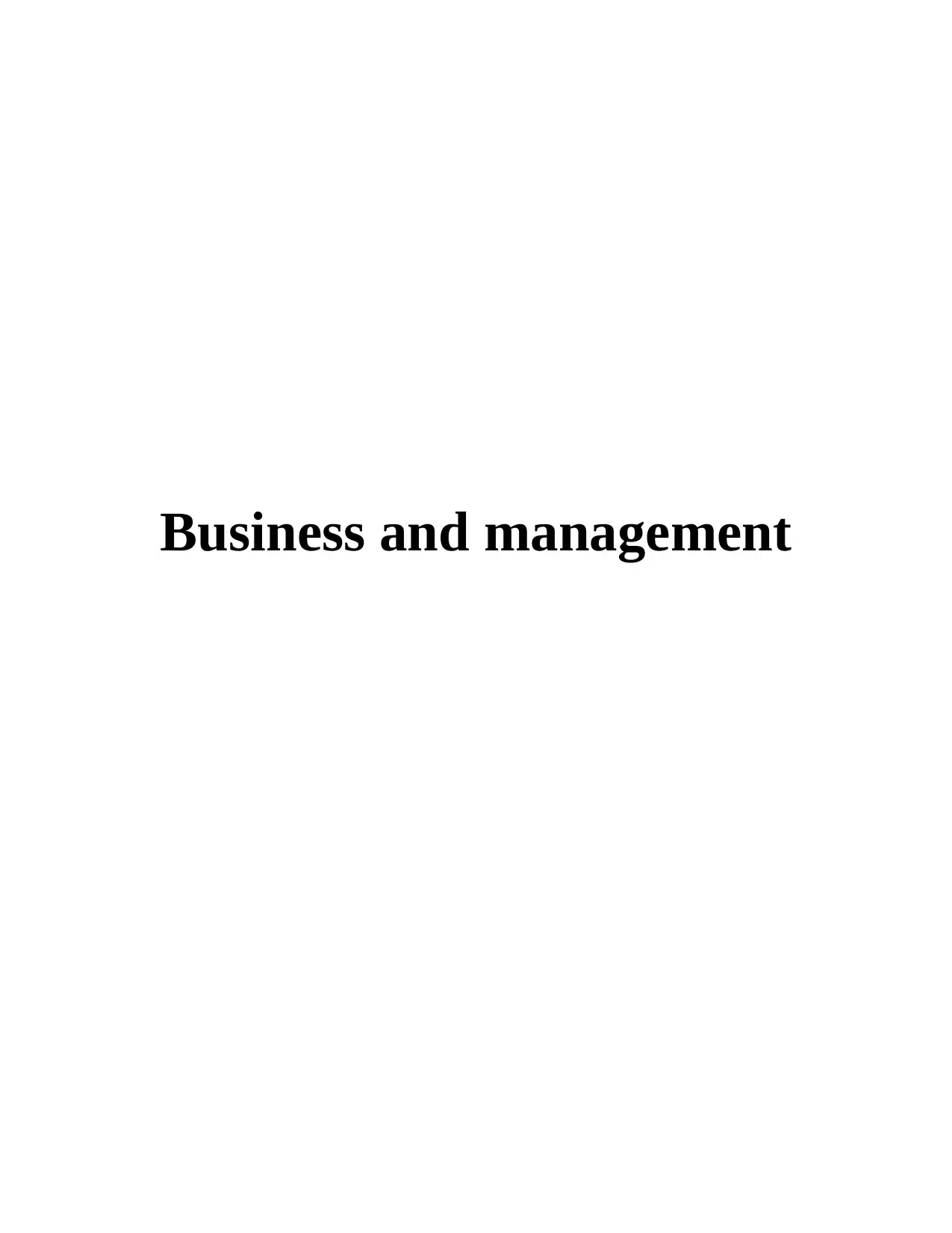
Business and management
Paraphrase This Document
Need a fresh take? Get an instant paraphrase of this document with our AI Paraphraser
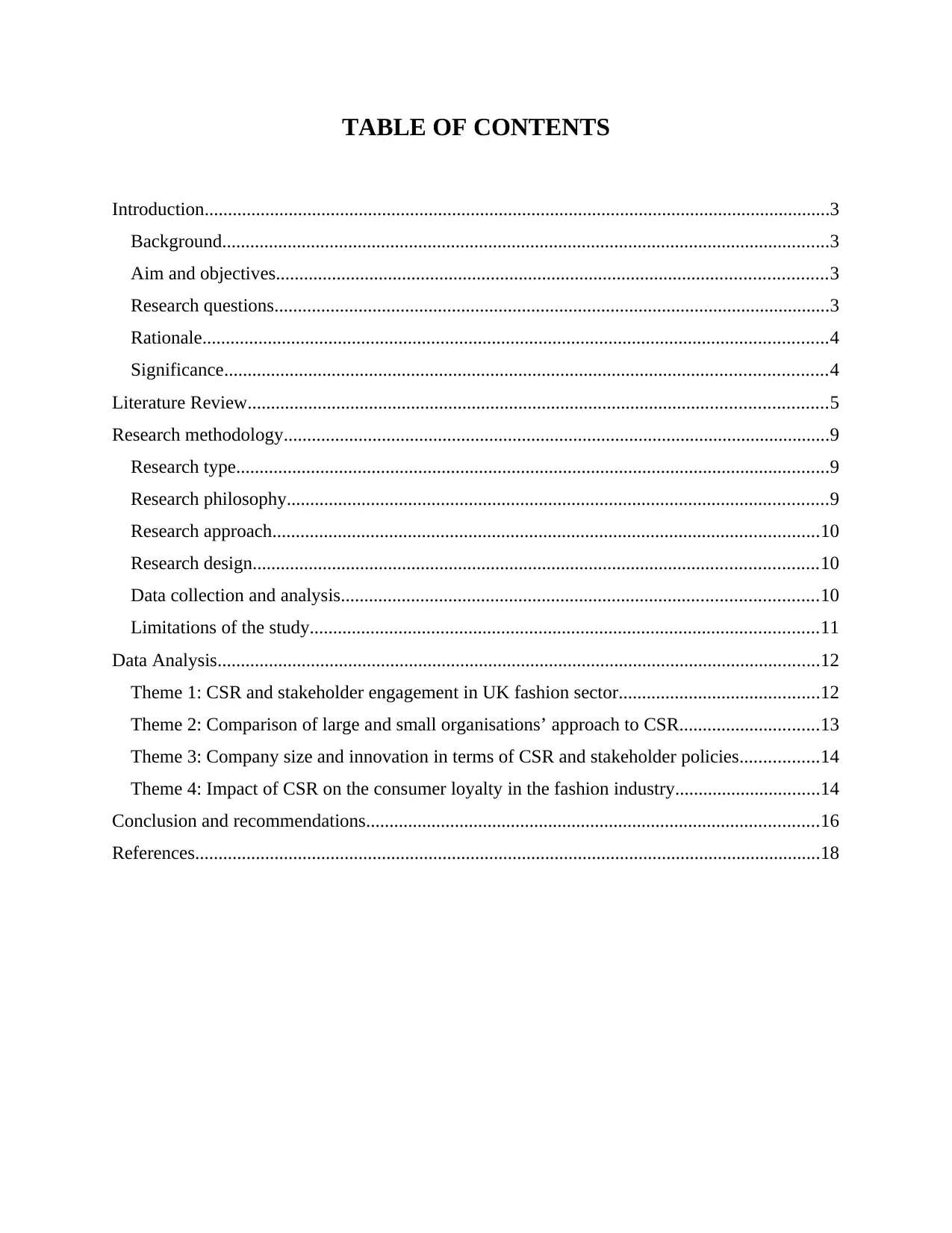
TABLE OF CONTENTS
Introduction......................................................................................................................................3
Background..................................................................................................................................3
Aim and objectives......................................................................................................................3
Research questions.......................................................................................................................3
Rationale......................................................................................................................................4
Significance.................................................................................................................................4
Literature Review............................................................................................................................5
Research methodology.....................................................................................................................9
Research type...............................................................................................................................9
Research philosophy....................................................................................................................9
Research approach.....................................................................................................................10
Research design.........................................................................................................................10
Data collection and analysis......................................................................................................10
Limitations of the study.............................................................................................................11
Data Analysis.................................................................................................................................12
Theme 1: CSR and stakeholder engagement in UK fashion sector...........................................12
Theme 2: Comparison of large and small organisations’ approach to CSR..............................13
Theme 3: Company size and innovation in terms of CSR and stakeholder policies.................14
Theme 4: Impact of CSR on the consumer loyalty in the fashion industry...............................14
Conclusion and recommendations.................................................................................................16
References......................................................................................................................................18
Introduction......................................................................................................................................3
Background..................................................................................................................................3
Aim and objectives......................................................................................................................3
Research questions.......................................................................................................................3
Rationale......................................................................................................................................4
Significance.................................................................................................................................4
Literature Review............................................................................................................................5
Research methodology.....................................................................................................................9
Research type...............................................................................................................................9
Research philosophy....................................................................................................................9
Research approach.....................................................................................................................10
Research design.........................................................................................................................10
Data collection and analysis......................................................................................................10
Limitations of the study.............................................................................................................11
Data Analysis.................................................................................................................................12
Theme 1: CSR and stakeholder engagement in UK fashion sector...........................................12
Theme 2: Comparison of large and small organisations’ approach to CSR..............................13
Theme 3: Company size and innovation in terms of CSR and stakeholder policies.................14
Theme 4: Impact of CSR on the consumer loyalty in the fashion industry...............................14
Conclusion and recommendations.................................................................................................16
References......................................................................................................................................18
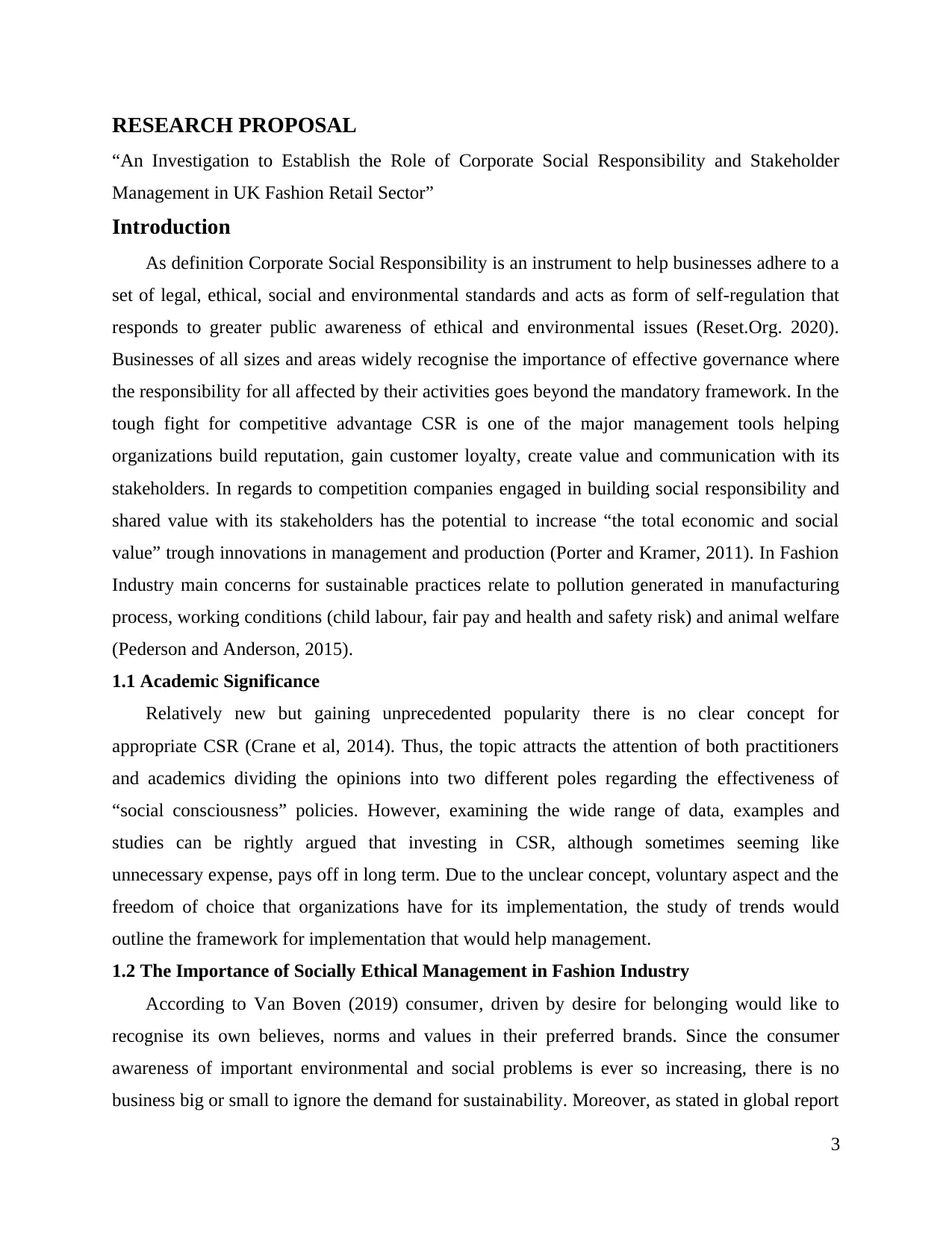
RESEARCH PROPOSAL
“An Investigation to Establish the Role of Corporate Social Responsibility and Stakeholder
Management in UK Fashion Retail Sector”
Introduction
As definition Corporate Social Responsibility is an instrument to help businesses adhere to a
set of legal, ethical, social and environmental standards and acts as form of self-regulation that
responds to greater public awareness of ethical and environmental issues (Reset.Org. 2020).
Businesses of all sizes and areas widely recognise the importance of effective governance where
the responsibility for all affected by their activities goes beyond the mandatory framework. In the
tough fight for competitive advantage CSR is one of the major management tools helping
organizations build reputation, gain customer loyalty, create value and communication with its
stakeholders. In regards to competition companies engaged in building social responsibility and
shared value with its stakeholders has the potential to increase “the total economic and social
value” trough innovations in management and production (Porter and Kramer, 2011). In Fashion
Industry main concerns for sustainable practices relate to pollution generated in manufacturing
process, working conditions (child labour, fair pay and health and safety risk) and animal welfare
(Pederson and Anderson, 2015).
1.1 Academic Significance
Relatively new but gaining unprecedented popularity there is no clear concept for
appropriate CSR (Crane et al, 2014). Thus, the topic attracts the attention of both practitioners
and academics dividing the opinions into two different poles regarding the effectiveness of
“social consciousness” policies. However, examining the wide range of data, examples and
studies can be rightly argued that investing in CSR, although sometimes seeming like
unnecessary expense, pays off in long term. Due to the unclear concept, voluntary aspect and the
freedom of choice that organizations have for its implementation, the study of trends would
outline the framework for implementation that would help management.
1.2 The Importance of Socially Ethical Management in Fashion Industry
According to Van Boven (2019) consumer, driven by desire for belonging would like to
recognise its own believes, norms and values in their preferred brands. Since the consumer
awareness of important environmental and social problems is ever so increasing, there is no
business big or small to ignore the demand for sustainability. Moreover, as stated in global report
3
“An Investigation to Establish the Role of Corporate Social Responsibility and Stakeholder
Management in UK Fashion Retail Sector”
Introduction
As definition Corporate Social Responsibility is an instrument to help businesses adhere to a
set of legal, ethical, social and environmental standards and acts as form of self-regulation that
responds to greater public awareness of ethical and environmental issues (Reset.Org. 2020).
Businesses of all sizes and areas widely recognise the importance of effective governance where
the responsibility for all affected by their activities goes beyond the mandatory framework. In the
tough fight for competitive advantage CSR is one of the major management tools helping
organizations build reputation, gain customer loyalty, create value and communication with its
stakeholders. In regards to competition companies engaged in building social responsibility and
shared value with its stakeholders has the potential to increase “the total economic and social
value” trough innovations in management and production (Porter and Kramer, 2011). In Fashion
Industry main concerns for sustainable practices relate to pollution generated in manufacturing
process, working conditions (child labour, fair pay and health and safety risk) and animal welfare
(Pederson and Anderson, 2015).
1.1 Academic Significance
Relatively new but gaining unprecedented popularity there is no clear concept for
appropriate CSR (Crane et al, 2014). Thus, the topic attracts the attention of both practitioners
and academics dividing the opinions into two different poles regarding the effectiveness of
“social consciousness” policies. However, examining the wide range of data, examples and
studies can be rightly argued that investing in CSR, although sometimes seeming like
unnecessary expense, pays off in long term. Due to the unclear concept, voluntary aspect and the
freedom of choice that organizations have for its implementation, the study of trends would
outline the framework for implementation that would help management.
1.2 The Importance of Socially Ethical Management in Fashion Industry
According to Van Boven (2019) consumer, driven by desire for belonging would like to
recognise its own believes, norms and values in their preferred brands. Since the consumer
awareness of important environmental and social problems is ever so increasing, there is no
business big or small to ignore the demand for sustainability. Moreover, as stated in global report
3
⊘ This is a preview!⊘
Do you want full access?
Subscribe today to unlock all pages.

Trusted by 1+ million students worldwide
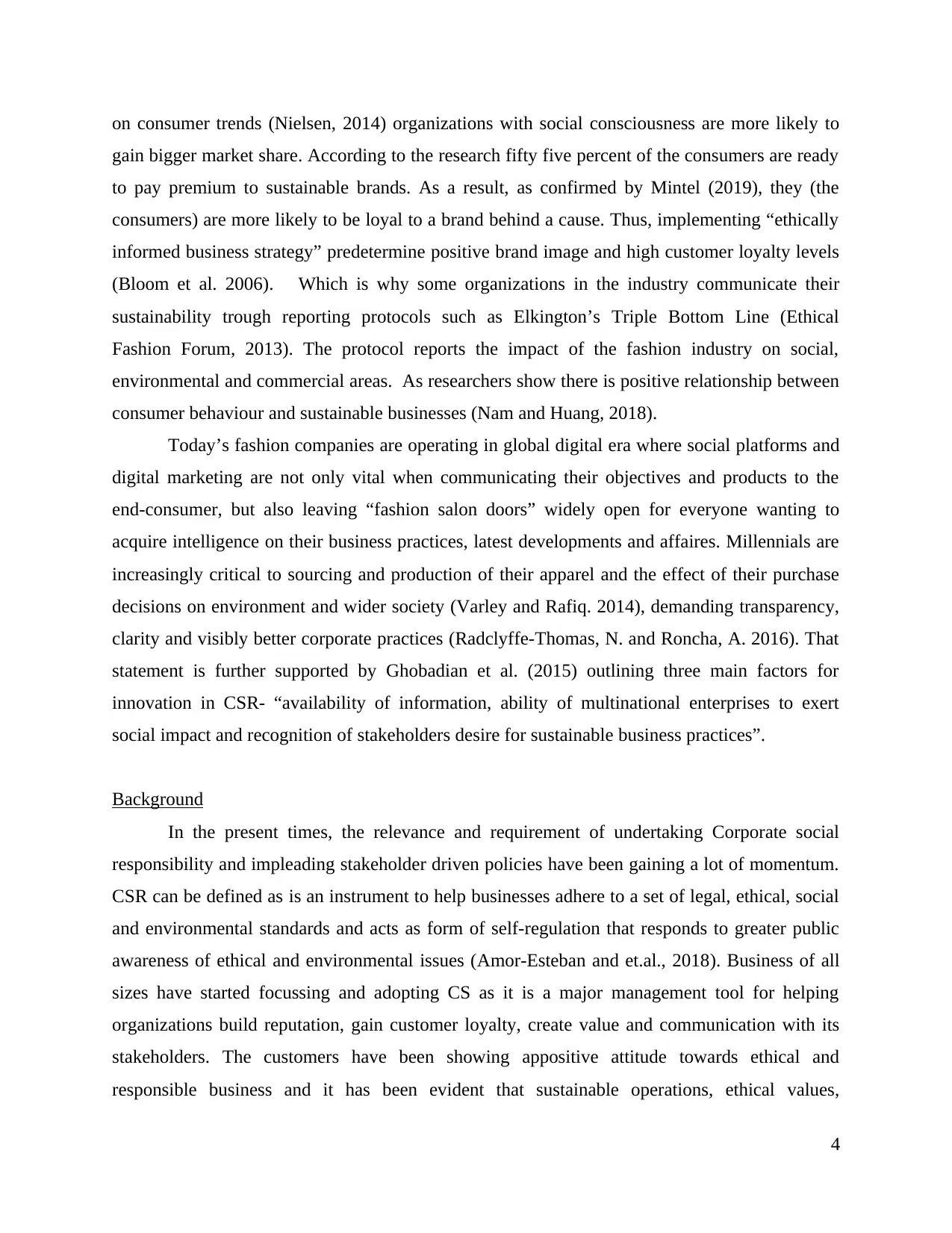
on consumer trends (Nielsen, 2014) organizations with social consciousness are more likely to
gain bigger market share. According to the research fifty five percent of the consumers are ready
to pay premium to sustainable brands. As a result, as confirmed by Mintel (2019), they (the
consumers) are more likely to be loyal to a brand behind a cause. Thus, implementing “ethically
informed business strategy” predetermine positive brand image and high customer loyalty levels
(Bloom et al. 2006). Which is why some organizations in the industry communicate their
sustainability trough reporting protocols such as Elkington’s Triple Bottom Line (Ethical
Fashion Forum, 2013). The protocol reports the impact of the fashion industry on social,
environmental and commercial areas. As researchers show there is positive relationship between
consumer behaviour and sustainable businesses (Nam and Huang, 2018).
Today’s fashion companies are operating in global digital era where social platforms and
digital marketing are not only vital when communicating their objectives and products to the
end-consumer, but also leaving “fashion salon doors” widely open for everyone wanting to
acquire intelligence on their business practices, latest developments and affaires. Millennials are
increasingly critical to sourcing and production of their apparel and the effect of their purchase
decisions on environment and wider society (Varley and Rafiq. 2014), demanding transparency,
clarity and visibly better corporate practices (Radclyffe-Thomas, N. and Roncha, A. 2016). That
statement is further supported by Ghobadian et al. (2015) outlining three main factors for
innovation in CSR- “availability of information, ability of multinational enterprises to exert
social impact and recognition of stakeholders desire for sustainable business practices”.
Background
In the present times, the relevance and requirement of undertaking Corporate social
responsibility and impleading stakeholder driven policies have been gaining a lot of momentum.
CSR can be defined as is an instrument to help businesses adhere to a set of legal, ethical, social
and environmental standards and acts as form of self-regulation that responds to greater public
awareness of ethical and environmental issues (Amor‐Esteban and et.al., 2018). Business of all
sizes have started focussing and adopting CS as it is a major management tool for helping
organizations build reputation, gain customer loyalty, create value and communication with its
stakeholders. The customers have been showing appositive attitude towards ethical and
responsible business and it has been evident that sustainable operations, ethical values,
4
gain bigger market share. According to the research fifty five percent of the consumers are ready
to pay premium to sustainable brands. As a result, as confirmed by Mintel (2019), they (the
consumers) are more likely to be loyal to a brand behind a cause. Thus, implementing “ethically
informed business strategy” predetermine positive brand image and high customer loyalty levels
(Bloom et al. 2006). Which is why some organizations in the industry communicate their
sustainability trough reporting protocols such as Elkington’s Triple Bottom Line (Ethical
Fashion Forum, 2013). The protocol reports the impact of the fashion industry on social,
environmental and commercial areas. As researchers show there is positive relationship between
consumer behaviour and sustainable businesses (Nam and Huang, 2018).
Today’s fashion companies are operating in global digital era where social platforms and
digital marketing are not only vital when communicating their objectives and products to the
end-consumer, but also leaving “fashion salon doors” widely open for everyone wanting to
acquire intelligence on their business practices, latest developments and affaires. Millennials are
increasingly critical to sourcing and production of their apparel and the effect of their purchase
decisions on environment and wider society (Varley and Rafiq. 2014), demanding transparency,
clarity and visibly better corporate practices (Radclyffe-Thomas, N. and Roncha, A. 2016). That
statement is further supported by Ghobadian et al. (2015) outlining three main factors for
innovation in CSR- “availability of information, ability of multinational enterprises to exert
social impact and recognition of stakeholders desire for sustainable business practices”.
Background
In the present times, the relevance and requirement of undertaking Corporate social
responsibility and impleading stakeholder driven policies have been gaining a lot of momentum.
CSR can be defined as is an instrument to help businesses adhere to a set of legal, ethical, social
and environmental standards and acts as form of self-regulation that responds to greater public
awareness of ethical and environmental issues (Amor‐Esteban and et.al., 2018). Business of all
sizes have started focussing and adopting CS as it is a major management tool for helping
organizations build reputation, gain customer loyalty, create value and communication with its
stakeholders. The customers have been showing appositive attitude towards ethical and
responsible business and it has been evident that sustainable operations, ethical values,
4
Paraphrase This Document
Need a fresh take? Get an instant paraphrase of this document with our AI Paraphraser
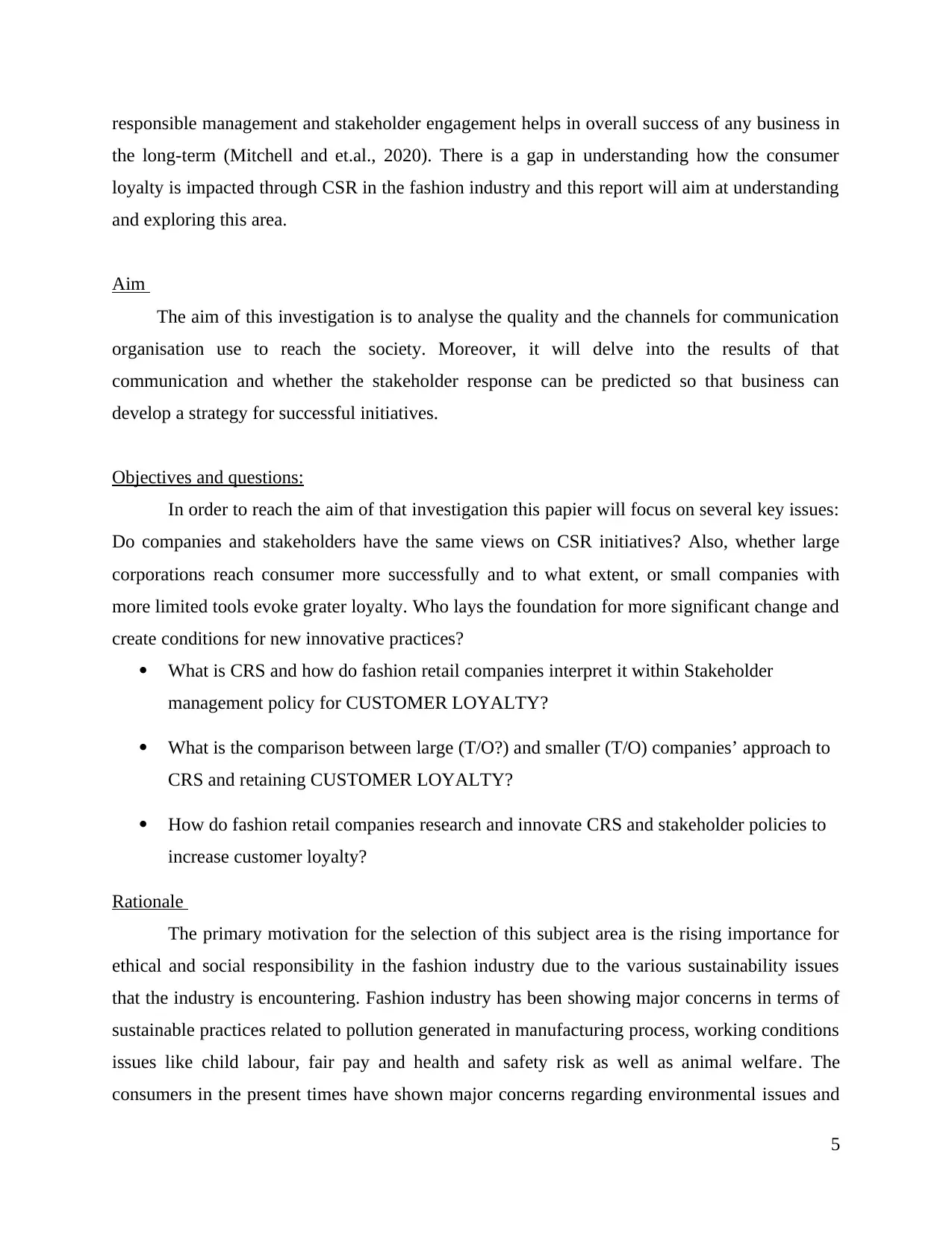
responsible management and stakeholder engagement helps in overall success of any business in
the long-term (Mitchell and et.al., 2020). There is a gap in understanding how the consumer
loyalty is impacted through CSR in the fashion industry and this report will aim at understanding
and exploring this area.
Aim
The aim of this investigation is to analyse the quality and the channels for communication
organisation use to reach the society. Moreover, it will delve into the results of that
communication and whether the stakeholder response can be predicted so that business can
develop a strategy for successful initiatives.
Objectives and questions:
In order to reach the aim of that investigation this papier will focus on several key issues:
Do companies and stakeholders have the same views on CSR initiatives? Also, whether large
corporations reach consumer more successfully and to what extent, or small companies with
more limited tools evoke grater loyalty. Who lays the foundation for more significant change and
create conditions for new innovative practices?
What is CRS and how do fashion retail companies interpret it within Stakeholder
management policy for CUSTOMER LOYALTY?
What is the comparison between large (T/O?) and smaller (T/O) companies’ approach to
CRS and retaining CUSTOMER LOYALTY?
How do fashion retail companies research and innovate CRS and stakeholder policies to
increase customer loyalty?
Rationale
The primary motivation for the selection of this subject area is the rising importance for
ethical and social responsibility in the fashion industry due to the various sustainability issues
that the industry is encountering. Fashion industry has been showing major concerns in terms of
sustainable practices related to pollution generated in manufacturing process, working conditions
issues like child labour, fair pay and health and safety risk as well as animal welfare. The
consumers in the present times have shown major concerns regarding environmental issues and
5
the long-term (Mitchell and et.al., 2020). There is a gap in understanding how the consumer
loyalty is impacted through CSR in the fashion industry and this report will aim at understanding
and exploring this area.
Aim
The aim of this investigation is to analyse the quality and the channels for communication
organisation use to reach the society. Moreover, it will delve into the results of that
communication and whether the stakeholder response can be predicted so that business can
develop a strategy for successful initiatives.
Objectives and questions:
In order to reach the aim of that investigation this papier will focus on several key issues:
Do companies and stakeholders have the same views on CSR initiatives? Also, whether large
corporations reach consumer more successfully and to what extent, or small companies with
more limited tools evoke grater loyalty. Who lays the foundation for more significant change and
create conditions for new innovative practices?
What is CRS and how do fashion retail companies interpret it within Stakeholder
management policy for CUSTOMER LOYALTY?
What is the comparison between large (T/O?) and smaller (T/O) companies’ approach to
CRS and retaining CUSTOMER LOYALTY?
How do fashion retail companies research and innovate CRS and stakeholder policies to
increase customer loyalty?
Rationale
The primary motivation for the selection of this subject area is the rising importance for
ethical and social responsibility in the fashion industry due to the various sustainability issues
that the industry is encountering. Fashion industry has been showing major concerns in terms of
sustainable practices related to pollution generated in manufacturing process, working conditions
issues like child labour, fair pay and health and safety risk as well as animal welfare. The
consumers in the present times have shown major concerns regarding environmental issues and
5
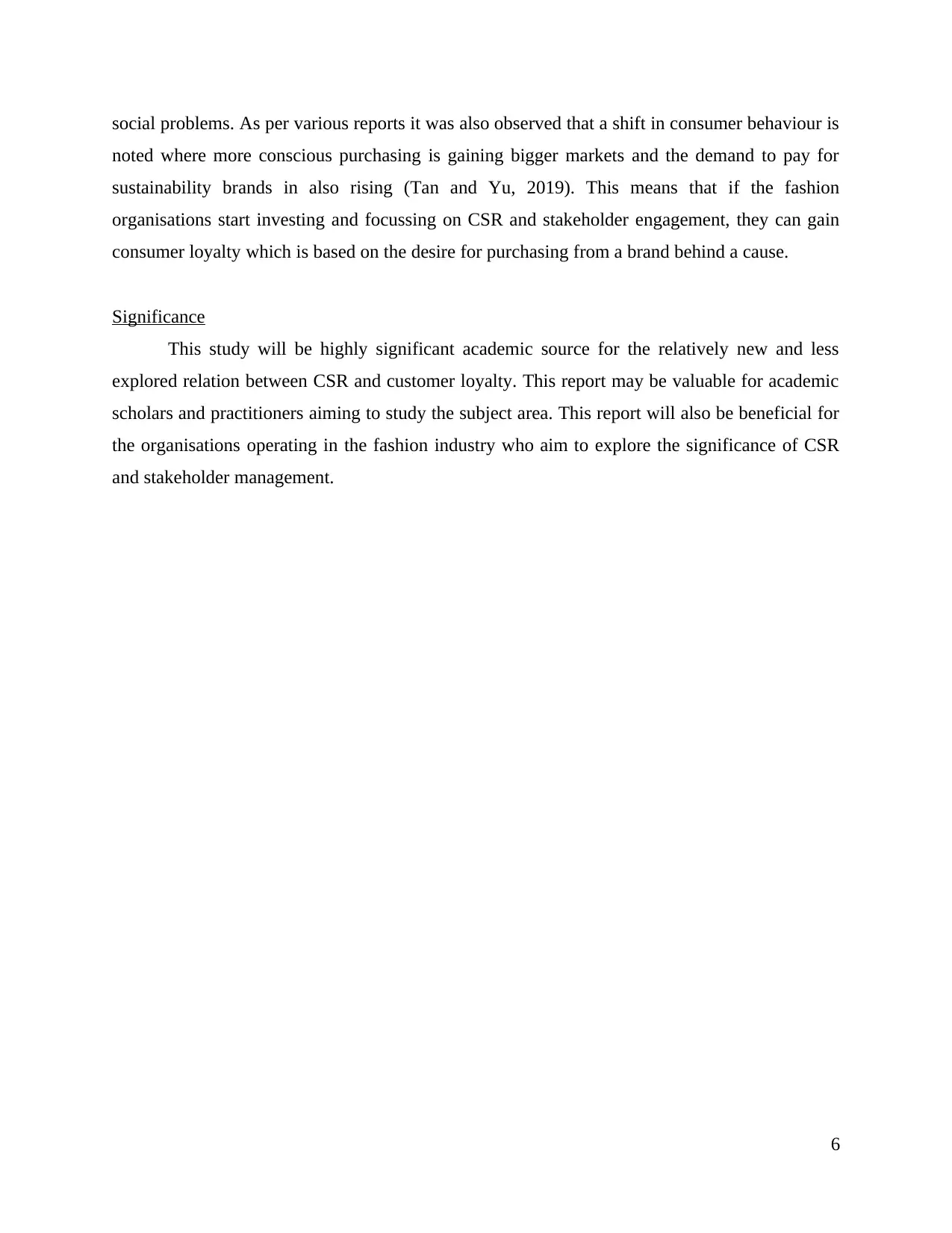
social problems. As per various reports it was also observed that a shift in consumer behaviour is
noted where more conscious purchasing is gaining bigger markets and the demand to pay for
sustainability brands in also rising (Tan and Yu, 2019). This means that if the fashion
organisations start investing and focussing on CSR and stakeholder engagement, they can gain
consumer loyalty which is based on the desire for purchasing from a brand behind a cause.
Significance
This study will be highly significant academic source for the relatively new and less
explored relation between CSR and customer loyalty. This report may be valuable for academic
scholars and practitioners aiming to study the subject area. This report will also be beneficial for
the organisations operating in the fashion industry who aim to explore the significance of CSR
and stakeholder management.
6
noted where more conscious purchasing is gaining bigger markets and the demand to pay for
sustainability brands in also rising (Tan and Yu, 2019). This means that if the fashion
organisations start investing and focussing on CSR and stakeholder engagement, they can gain
consumer loyalty which is based on the desire for purchasing from a brand behind a cause.
Significance
This study will be highly significant academic source for the relatively new and less
explored relation between CSR and customer loyalty. This report may be valuable for academic
scholars and practitioners aiming to study the subject area. This report will also be beneficial for
the organisations operating in the fashion industry who aim to explore the significance of CSR
and stakeholder management.
6
⊘ This is a preview!⊘
Do you want full access?
Subscribe today to unlock all pages.

Trusted by 1+ million students worldwide
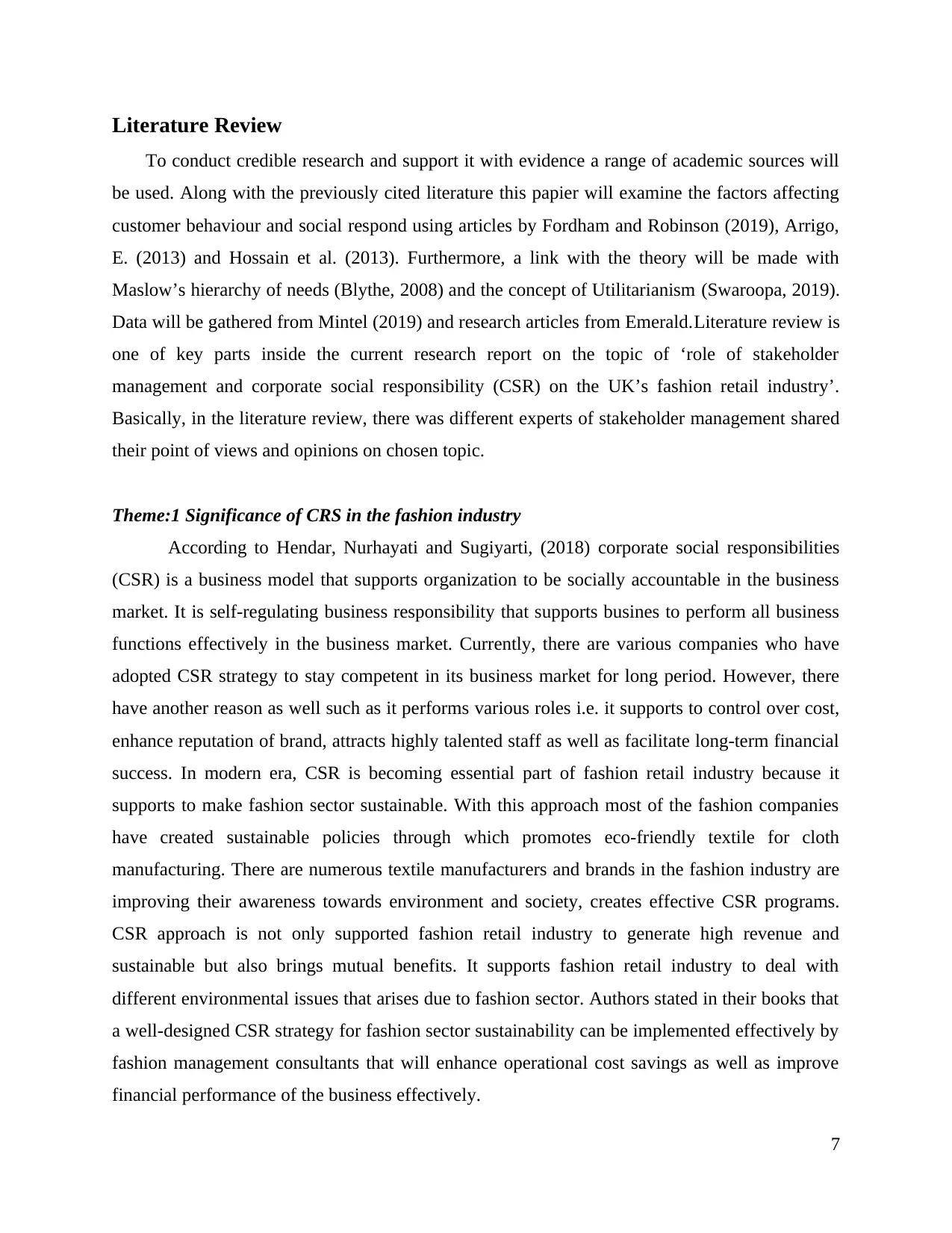
Literature Review
To conduct credible research and support it with evidence a range of academic sources will
be used. Along with the previously cited literature this papier will examine the factors affecting
customer behaviour and social respond using articles by Fordham and Robinson (2019), Arrigo,
E. (2013) and Hossain et al. (2013). Furthermore, a link with the theory will be made with
Maslow’s hierarchy of needs (Blythe, 2008) and the concept of Utilitarianism (Swaroopa, 2019).
Data will be gathered from Mintel (2019) and research articles from Emerald.Literature review is
one of key parts inside the current research report on the topic of ‘role of stakeholder
management and corporate social responsibility (CSR) on the UK’s fashion retail industry’.
Basically, in the literature review, there was different experts of stakeholder management shared
their point of views and opinions on chosen topic.
Theme:1 Significance of CRS in the fashion industry
According to Hendar, Nurhayati and Sugiyarti, (2018) corporate social responsibilities
(CSR) is a business model that supports organization to be socially accountable in the business
market. It is self-regulating business responsibility that supports busines to perform all business
functions effectively in the business market. Currently, there are various companies who have
adopted CSR strategy to stay competent in its business market for long period. However, there
have another reason as well such as it performs various roles i.e. it supports to control over cost,
enhance reputation of brand, attracts highly talented staff as well as facilitate long-term financial
success. In modern era, CSR is becoming essential part of fashion retail industry because it
supports to make fashion sector sustainable. With this approach most of the fashion companies
have created sustainable policies through which promotes eco-friendly textile for cloth
manufacturing. There are numerous textile manufacturers and brands in the fashion industry are
improving their awareness towards environment and society, creates effective CSR programs.
CSR approach is not only supported fashion retail industry to generate high revenue and
sustainable but also brings mutual benefits. It supports fashion retail industry to deal with
different environmental issues that arises due to fashion sector. Authors stated in their books that
a well-designed CSR strategy for fashion sector sustainability can be implemented effectively by
fashion management consultants that will enhance operational cost savings as well as improve
financial performance of the business effectively.
7
To conduct credible research and support it with evidence a range of academic sources will
be used. Along with the previously cited literature this papier will examine the factors affecting
customer behaviour and social respond using articles by Fordham and Robinson (2019), Arrigo,
E. (2013) and Hossain et al. (2013). Furthermore, a link with the theory will be made with
Maslow’s hierarchy of needs (Blythe, 2008) and the concept of Utilitarianism (Swaroopa, 2019).
Data will be gathered from Mintel (2019) and research articles from Emerald.Literature review is
one of key parts inside the current research report on the topic of ‘role of stakeholder
management and corporate social responsibility (CSR) on the UK’s fashion retail industry’.
Basically, in the literature review, there was different experts of stakeholder management shared
their point of views and opinions on chosen topic.
Theme:1 Significance of CRS in the fashion industry
According to Hendar, Nurhayati and Sugiyarti, (2018) corporate social responsibilities
(CSR) is a business model that supports organization to be socially accountable in the business
market. It is self-regulating business responsibility that supports busines to perform all business
functions effectively in the business market. Currently, there are various companies who have
adopted CSR strategy to stay competent in its business market for long period. However, there
have another reason as well such as it performs various roles i.e. it supports to control over cost,
enhance reputation of brand, attracts highly talented staff as well as facilitate long-term financial
success. In modern era, CSR is becoming essential part of fashion retail industry because it
supports to make fashion sector sustainable. With this approach most of the fashion companies
have created sustainable policies through which promotes eco-friendly textile for cloth
manufacturing. There are numerous textile manufacturers and brands in the fashion industry are
improving their awareness towards environment and society, creates effective CSR programs.
CSR approach is not only supported fashion retail industry to generate high revenue and
sustainable but also brings mutual benefits. It supports fashion retail industry to deal with
different environmental issues that arises due to fashion sector. Authors stated in their books that
a well-designed CSR strategy for fashion sector sustainability can be implemented effectively by
fashion management consultants that will enhance operational cost savings as well as improve
financial performance of the business effectively.
7
Paraphrase This Document
Need a fresh take? Get an instant paraphrase of this document with our AI Paraphraser
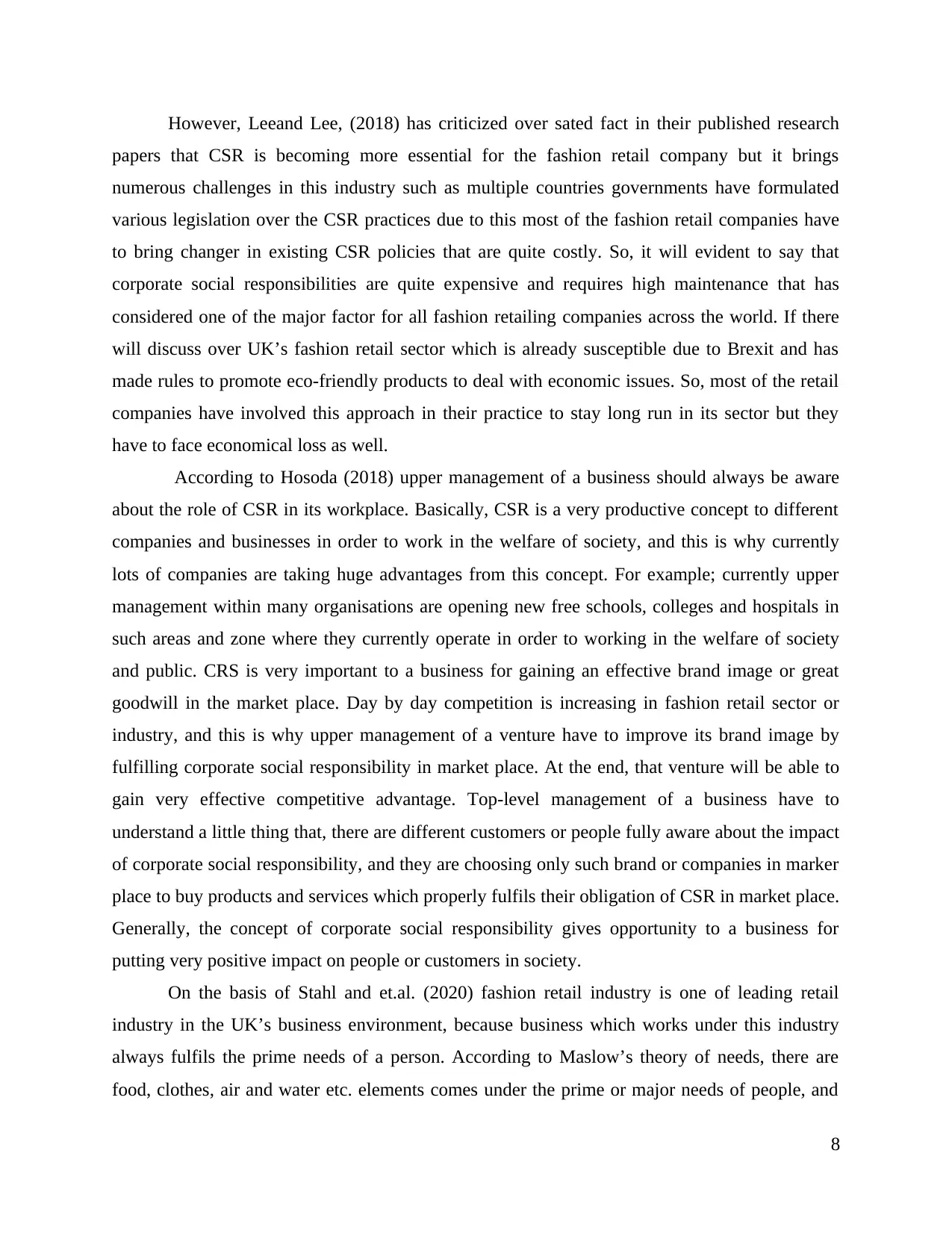
However, Leeand Lee, (2018) has criticized over sated fact in their published research
papers that CSR is becoming more essential for the fashion retail company but it brings
numerous challenges in this industry such as multiple countries governments have formulated
various legislation over the CSR practices due to this most of the fashion retail companies have
to bring changer in existing CSR policies that are quite costly. So, it will evident to say that
corporate social responsibilities are quite expensive and requires high maintenance that has
considered one of the major factor for all fashion retailing companies across the world. If there
will discuss over UK’s fashion retail sector which is already susceptible due to Brexit and has
made rules to promote eco-friendly products to deal with economic issues. So, most of the retail
companies have involved this approach in their practice to stay long run in its sector but they
have to face economical loss as well.
According to Hosoda (2018) upper management of a business should always be aware
about the role of CSR in its workplace. Basically, CSR is a very productive concept to different
companies and businesses in order to work in the welfare of society, and this is why currently
lots of companies are taking huge advantages from this concept. For example; currently upper
management within many organisations are opening new free schools, colleges and hospitals in
such areas and zone where they currently operate in order to working in the welfare of society
and public. CRS is very important to a business for gaining an effective brand image or great
goodwill in the market place. Day by day competition is increasing in fashion retail sector or
industry, and this is why upper management of a venture have to improve its brand image by
fulfilling corporate social responsibility in market place. At the end, that venture will be able to
gain very effective competitive advantage. Top-level management of a business have to
understand a little thing that, there are different customers or people fully aware about the impact
of corporate social responsibility, and they are choosing only such brand or companies in marker
place to buy products and services which properly fulfils their obligation of CSR in market place.
Generally, the concept of corporate social responsibility gives opportunity to a business for
putting very positive impact on people or customers in society.
On the basis of Stahl and et.al. (2020) fashion retail industry is one of leading retail
industry in the UK’s business environment, because business which works under this industry
always fulfils the prime needs of a person. According to Maslow’s theory of needs, there are
food, clothes, air and water etc. elements comes under the prime or major needs of people, and
8
papers that CSR is becoming more essential for the fashion retail company but it brings
numerous challenges in this industry such as multiple countries governments have formulated
various legislation over the CSR practices due to this most of the fashion retail companies have
to bring changer in existing CSR policies that are quite costly. So, it will evident to say that
corporate social responsibilities are quite expensive and requires high maintenance that has
considered one of the major factor for all fashion retailing companies across the world. If there
will discuss over UK’s fashion retail sector which is already susceptible due to Brexit and has
made rules to promote eco-friendly products to deal with economic issues. So, most of the retail
companies have involved this approach in their practice to stay long run in its sector but they
have to face economical loss as well.
According to Hosoda (2018) upper management of a business should always be aware
about the role of CSR in its workplace. Basically, CSR is a very productive concept to different
companies and businesses in order to work in the welfare of society, and this is why currently
lots of companies are taking huge advantages from this concept. For example; currently upper
management within many organisations are opening new free schools, colleges and hospitals in
such areas and zone where they currently operate in order to working in the welfare of society
and public. CRS is very important to a business for gaining an effective brand image or great
goodwill in the market place. Day by day competition is increasing in fashion retail sector or
industry, and this is why upper management of a venture have to improve its brand image by
fulfilling corporate social responsibility in market place. At the end, that venture will be able to
gain very effective competitive advantage. Top-level management of a business have to
understand a little thing that, there are different customers or people fully aware about the impact
of corporate social responsibility, and they are choosing only such brand or companies in marker
place to buy products and services which properly fulfils their obligation of CSR in market place.
Generally, the concept of corporate social responsibility gives opportunity to a business for
putting very positive impact on people or customers in society.
On the basis of Stahl and et.al. (2020) fashion retail industry is one of leading retail
industry in the UK’s business environment, because business which works under this industry
always fulfils the prime needs of a person. According to Maslow’s theory of needs, there are
food, clothes, air and water etc. elements comes under the prime or major needs of people, and
8
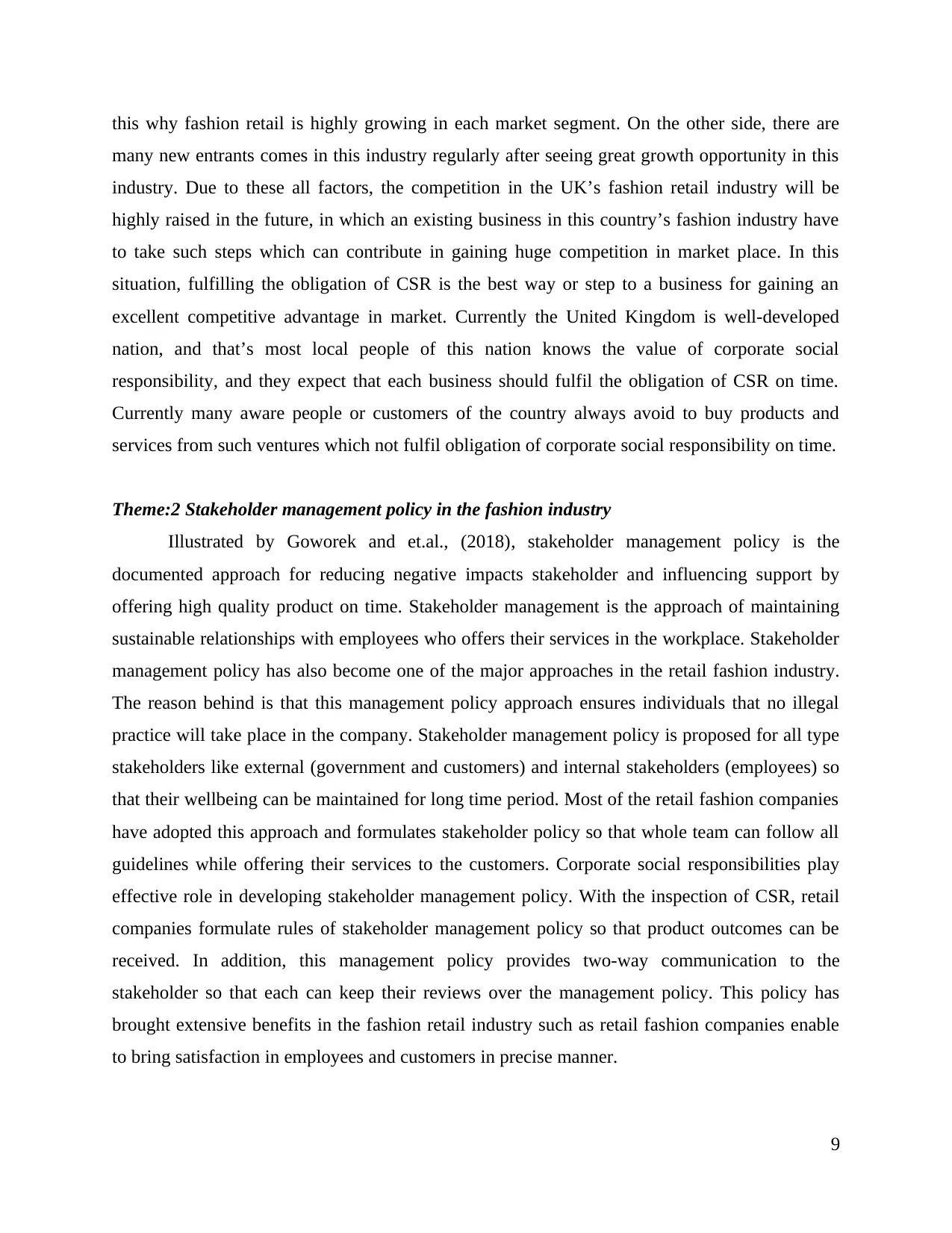
this why fashion retail is highly growing in each market segment. On the other side, there are
many new entrants comes in this industry regularly after seeing great growth opportunity in this
industry. Due to these all factors, the competition in the UK’s fashion retail industry will be
highly raised in the future, in which an existing business in this country’s fashion industry have
to take such steps which can contribute in gaining huge competition in market place. In this
situation, fulfilling the obligation of CSR is the best way or step to a business for gaining an
excellent competitive advantage in market. Currently the United Kingdom is well-developed
nation, and that’s most local people of this nation knows the value of corporate social
responsibility, and they expect that each business should fulfil the obligation of CSR on time.
Currently many aware people or customers of the country always avoid to buy products and
services from such ventures which not fulfil obligation of corporate social responsibility on time.
Theme:2 Stakeholder management policy in the fashion industry
Illustrated by Goworek and et.al., (2018), stakeholder management policy is the
documented approach for reducing negative impacts stakeholder and influencing support by
offering high quality product on time. Stakeholder management is the approach of maintaining
sustainable relationships with employees who offers their services in the workplace. Stakeholder
management policy has also become one of the major approaches in the retail fashion industry.
The reason behind is that this management policy approach ensures individuals that no illegal
practice will take place in the company. Stakeholder management policy is proposed for all type
stakeholders like external (government and customers) and internal stakeholders (employees) so
that their wellbeing can be maintained for long time period. Most of the retail fashion companies
have adopted this approach and formulates stakeholder policy so that whole team can follow all
guidelines while offering their services to the customers. Corporate social responsibilities play
effective role in developing stakeholder management policy. With the inspection of CSR, retail
companies formulate rules of stakeholder management policy so that product outcomes can be
received. In addition, this management policy provides two-way communication to the
stakeholder so that each can keep their reviews over the management policy. This policy has
brought extensive benefits in the fashion retail industry such as retail fashion companies enable
to bring satisfaction in employees and customers in precise manner.
9
many new entrants comes in this industry regularly after seeing great growth opportunity in this
industry. Due to these all factors, the competition in the UK’s fashion retail industry will be
highly raised in the future, in which an existing business in this country’s fashion industry have
to take such steps which can contribute in gaining huge competition in market place. In this
situation, fulfilling the obligation of CSR is the best way or step to a business for gaining an
excellent competitive advantage in market. Currently the United Kingdom is well-developed
nation, and that’s most local people of this nation knows the value of corporate social
responsibility, and they expect that each business should fulfil the obligation of CSR on time.
Currently many aware people or customers of the country always avoid to buy products and
services from such ventures which not fulfil obligation of corporate social responsibility on time.
Theme:2 Stakeholder management policy in the fashion industry
Illustrated by Goworek and et.al., (2018), stakeholder management policy is the
documented approach for reducing negative impacts stakeholder and influencing support by
offering high quality product on time. Stakeholder management is the approach of maintaining
sustainable relationships with employees who offers their services in the workplace. Stakeholder
management policy has also become one of the major approaches in the retail fashion industry.
The reason behind is that this management policy approach ensures individuals that no illegal
practice will take place in the company. Stakeholder management policy is proposed for all type
stakeholders like external (government and customers) and internal stakeholders (employees) so
that their wellbeing can be maintained for long time period. Most of the retail fashion companies
have adopted this approach and formulates stakeholder policy so that whole team can follow all
guidelines while offering their services to the customers. Corporate social responsibilities play
effective role in developing stakeholder management policy. With the inspection of CSR, retail
companies formulate rules of stakeholder management policy so that product outcomes can be
received. In addition, this management policy provides two-way communication to the
stakeholder so that each can keep their reviews over the management policy. This policy has
brought extensive benefits in the fashion retail industry such as retail fashion companies enable
to bring satisfaction in employees and customers in precise manner.
9
⊘ This is a preview!⊘
Do you want full access?
Subscribe today to unlock all pages.

Trusted by 1+ million students worldwide
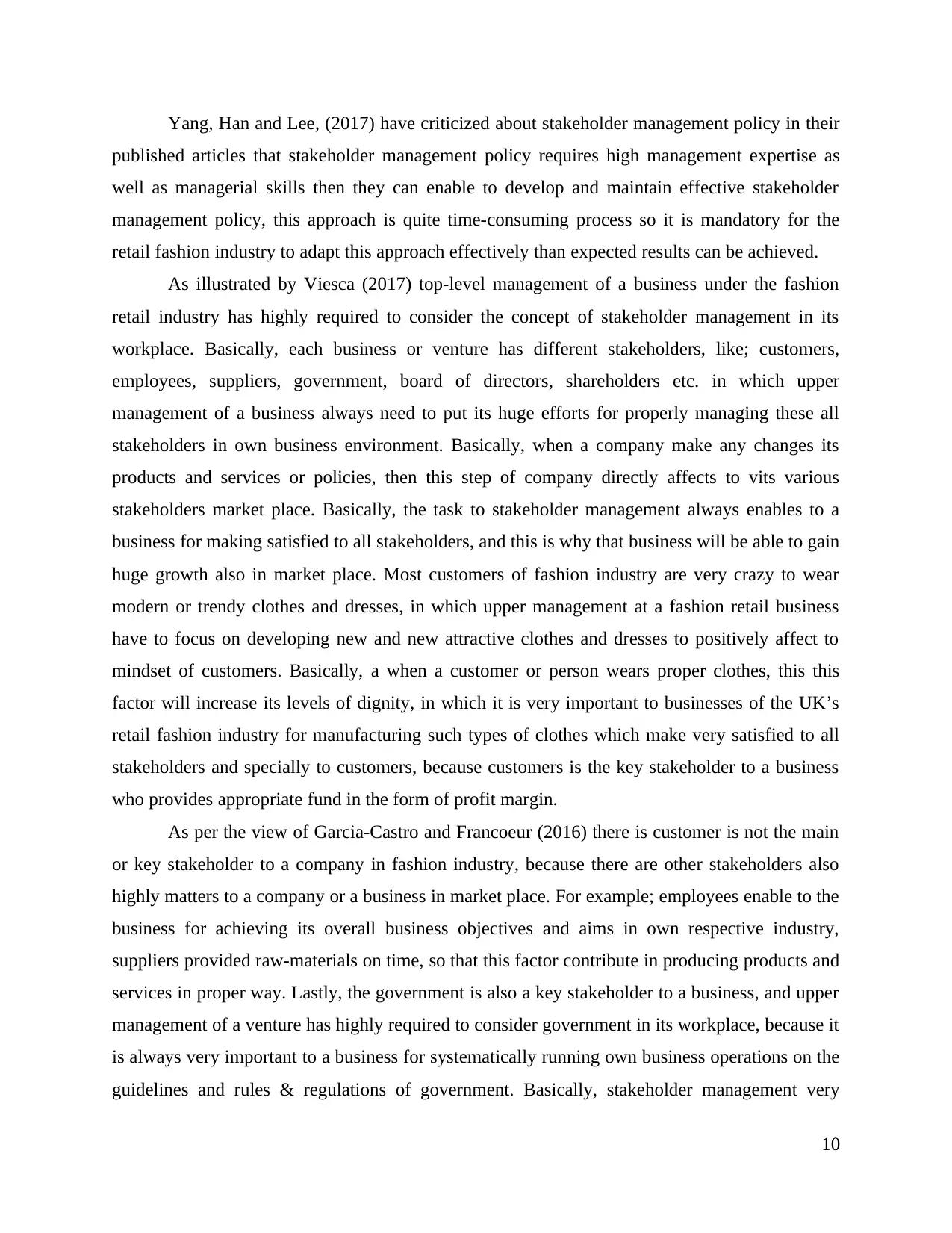
Yang, Han and Lee, (2017) have criticized about stakeholder management policy in their
published articles that stakeholder management policy requires high management expertise as
well as managerial skills then they can enable to develop and maintain effective stakeholder
management policy, this approach is quite time-consuming process so it is mandatory for the
retail fashion industry to adapt this approach effectively than expected results can be achieved.
As illustrated by Viesca (2017) top-level management of a business under the fashion
retail industry has highly required to consider the concept of stakeholder management in its
workplace. Basically, each business or venture has different stakeholders, like; customers,
employees, suppliers, government, board of directors, shareholders etc. in which upper
management of a business always need to put its huge efforts for properly managing these all
stakeholders in own business environment. Basically, when a company make any changes its
products and services or policies, then this step of company directly affects to vits various
stakeholders market place. Basically, the task to stakeholder management always enables to a
business for making satisfied to all stakeholders, and this is why that business will be able to gain
huge growth also in market place. Most customers of fashion industry are very crazy to wear
modern or trendy clothes and dresses, in which upper management at a fashion retail business
have to focus on developing new and new attractive clothes and dresses to positively affect to
mindset of customers. Basically, a when a customer or person wears proper clothes, this this
factor will increase its levels of dignity, in which it is very important to businesses of the UK’s
retail fashion industry for manufacturing such types of clothes which make very satisfied to all
stakeholders and specially to customers, because customers is the key stakeholder to a business
who provides appropriate fund in the form of profit margin.
As per the view of Garcia‐Castro and Francoeur (2016) there is customer is not the main
or key stakeholder to a company in fashion industry, because there are other stakeholders also
highly matters to a company or a business in market place. For example; employees enable to the
business for achieving its overall business objectives and aims in own respective industry,
suppliers provided raw-materials on time, so that this factor contribute in producing products and
services in proper way. Lastly, the government is also a key stakeholder to a business, and upper
management of a venture has highly required to consider government in its workplace, because it
is always very important to a business for systematically running own business operations on the
guidelines and rules & regulations of government. Basically, stakeholder management very
10
published articles that stakeholder management policy requires high management expertise as
well as managerial skills then they can enable to develop and maintain effective stakeholder
management policy, this approach is quite time-consuming process so it is mandatory for the
retail fashion industry to adapt this approach effectively than expected results can be achieved.
As illustrated by Viesca (2017) top-level management of a business under the fashion
retail industry has highly required to consider the concept of stakeholder management in its
workplace. Basically, each business or venture has different stakeholders, like; customers,
employees, suppliers, government, board of directors, shareholders etc. in which upper
management of a business always need to put its huge efforts for properly managing these all
stakeholders in own business environment. Basically, when a company make any changes its
products and services or policies, then this step of company directly affects to vits various
stakeholders market place. Basically, the task to stakeholder management always enables to a
business for making satisfied to all stakeholders, and this is why that business will be able to gain
huge growth also in market place. Most customers of fashion industry are very crazy to wear
modern or trendy clothes and dresses, in which upper management at a fashion retail business
have to focus on developing new and new attractive clothes and dresses to positively affect to
mindset of customers. Basically, a when a customer or person wears proper clothes, this this
factor will increase its levels of dignity, in which it is very important to businesses of the UK’s
retail fashion industry for manufacturing such types of clothes which make very satisfied to all
stakeholders and specially to customers, because customers is the key stakeholder to a business
who provides appropriate fund in the form of profit margin.
As per the view of Garcia‐Castro and Francoeur (2016) there is customer is not the main
or key stakeholder to a company in fashion industry, because there are other stakeholders also
highly matters to a company or a business in market place. For example; employees enable to the
business for achieving its overall business objectives and aims in own respective industry,
suppliers provided raw-materials on time, so that this factor contribute in producing products and
services in proper way. Lastly, the government is also a key stakeholder to a business, and upper
management of a venture has highly required to consider government in its workplace, because it
is always very important to a business for systematically running own business operations on the
guidelines and rules & regulations of government. Basically, stakeholder management very
10
Paraphrase This Document
Need a fresh take? Get an instant paraphrase of this document with our AI Paraphraser
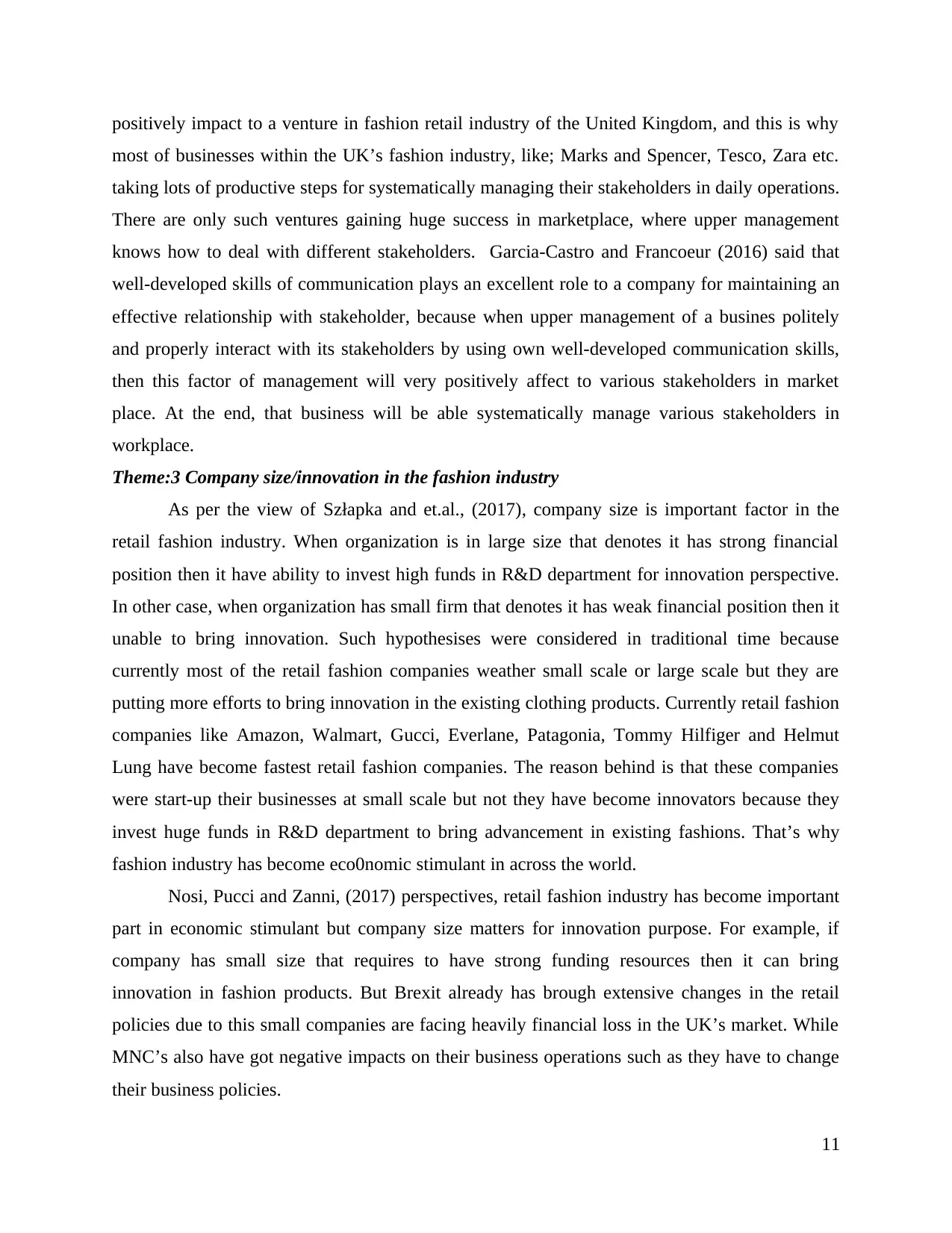
positively impact to a venture in fashion retail industry of the United Kingdom, and this is why
most of businesses within the UK’s fashion industry, like; Marks and Spencer, Tesco, Zara etc.
taking lots of productive steps for systematically managing their stakeholders in daily operations.
There are only such ventures gaining huge success in marketplace, where upper management
knows how to deal with different stakeholders. Garcia‐Castro and Francoeur (2016) said that
well-developed skills of communication plays an excellent role to a company for maintaining an
effective relationship with stakeholder, because when upper management of a busines politely
and properly interact with its stakeholders by using own well-developed communication skills,
then this factor of management will very positively affect to various stakeholders in market
place. At the end, that business will be able systematically manage various stakeholders in
workplace.
Theme:3 Company size/innovation in the fashion industry
As per the view of Szłapka and et.al., (2017), company size is important factor in the
retail fashion industry. When organization is in large size that denotes it has strong financial
position then it have ability to invest high funds in R&D department for innovation perspective.
In other case, when organization has small firm that denotes it has weak financial position then it
unable to bring innovation. Such hypothesises were considered in traditional time because
currently most of the retail fashion companies weather small scale or large scale but they are
putting more efforts to bring innovation in the existing clothing products. Currently retail fashion
companies like Amazon, Walmart, Gucci, Everlane, Patagonia, Tommy Hilfiger and Helmut
Lung have become fastest retail fashion companies. The reason behind is that these companies
were start-up their businesses at small scale but not they have become innovators because they
invest huge funds in R&D department to bring advancement in existing fashions. That’s why
fashion industry has become eco0nomic stimulant in across the world.
Nosi, Pucci and Zanni, (2017) perspectives, retail fashion industry has become important
part in economic stimulant but company size matters for innovation purpose. For example, if
company has small size that requires to have strong funding resources then it can bring
innovation in fashion products. But Brexit already has brough extensive changes in the retail
policies due to this small companies are facing heavily financial loss in the UK’s market. While
MNC’s also have got negative impacts on their business operations such as they have to change
their business policies.
11
most of businesses within the UK’s fashion industry, like; Marks and Spencer, Tesco, Zara etc.
taking lots of productive steps for systematically managing their stakeholders in daily operations.
There are only such ventures gaining huge success in marketplace, where upper management
knows how to deal with different stakeholders. Garcia‐Castro and Francoeur (2016) said that
well-developed skills of communication plays an excellent role to a company for maintaining an
effective relationship with stakeholder, because when upper management of a busines politely
and properly interact with its stakeholders by using own well-developed communication skills,
then this factor of management will very positively affect to various stakeholders in market
place. At the end, that business will be able systematically manage various stakeholders in
workplace.
Theme:3 Company size/innovation in the fashion industry
As per the view of Szłapka and et.al., (2017), company size is important factor in the
retail fashion industry. When organization is in large size that denotes it has strong financial
position then it have ability to invest high funds in R&D department for innovation perspective.
In other case, when organization has small firm that denotes it has weak financial position then it
unable to bring innovation. Such hypothesises were considered in traditional time because
currently most of the retail fashion companies weather small scale or large scale but they are
putting more efforts to bring innovation in the existing clothing products. Currently retail fashion
companies like Amazon, Walmart, Gucci, Everlane, Patagonia, Tommy Hilfiger and Helmut
Lung have become fastest retail fashion companies. The reason behind is that these companies
were start-up their businesses at small scale but not they have become innovators because they
invest huge funds in R&D department to bring advancement in existing fashions. That’s why
fashion industry has become eco0nomic stimulant in across the world.
Nosi, Pucci and Zanni, (2017) perspectives, retail fashion industry has become important
part in economic stimulant but company size matters for innovation purpose. For example, if
company has small size that requires to have strong funding resources then it can bring
innovation in fashion products. But Brexit already has brough extensive changes in the retail
policies due to this small companies are facing heavily financial loss in the UK’s market. While
MNC’s also have got negative impacts on their business operations such as they have to change
their business policies.
11
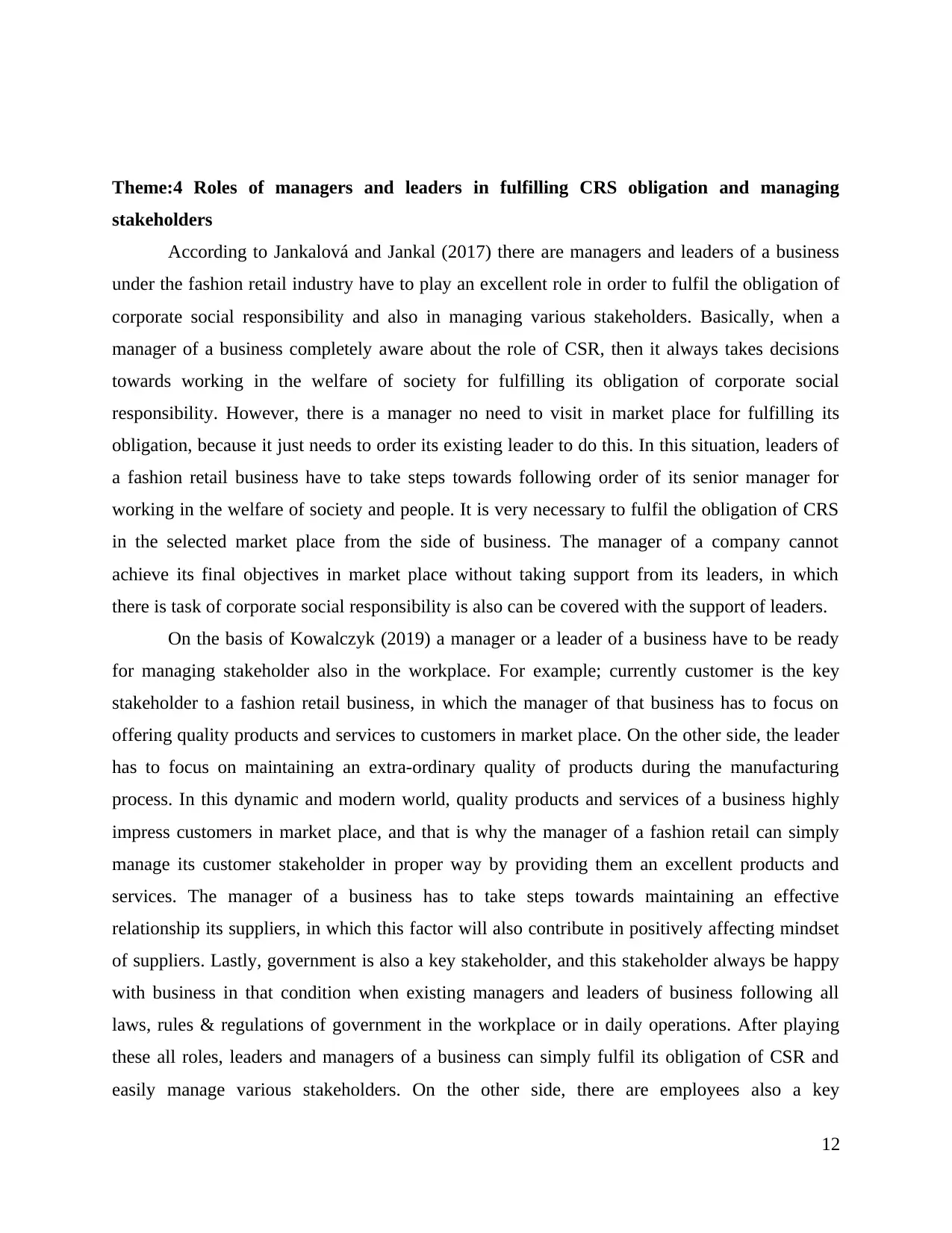
Theme:4 Roles of managers and leaders in fulfilling CRS obligation and managing
stakeholders
According to Jankalová and Jankal (2017) there are managers and leaders of a business
under the fashion retail industry have to play an excellent role in order to fulfil the obligation of
corporate social responsibility and also in managing various stakeholders. Basically, when a
manager of a business completely aware about the role of CSR, then it always takes decisions
towards working in the welfare of society for fulfilling its obligation of corporate social
responsibility. However, there is a manager no need to visit in market place for fulfilling its
obligation, because it just needs to order its existing leader to do this. In this situation, leaders of
a fashion retail business have to take steps towards following order of its senior manager for
working in the welfare of society and people. It is very necessary to fulfil the obligation of CRS
in the selected market place from the side of business. The manager of a company cannot
achieve its final objectives in market place without taking support from its leaders, in which
there is task of corporate social responsibility is also can be covered with the support of leaders.
On the basis of Kowalczyk (2019) a manager or a leader of a business have to be ready
for managing stakeholder also in the workplace. For example; currently customer is the key
stakeholder to a fashion retail business, in which the manager of that business has to focus on
offering quality products and services to customers in market place. On the other side, the leader
has to focus on maintaining an extra-ordinary quality of products during the manufacturing
process. In this dynamic and modern world, quality products and services of a business highly
impress customers in market place, and that is why the manager of a fashion retail can simply
manage its customer stakeholder in proper way by providing them an excellent products and
services. The manager of a business has to take steps towards maintaining an effective
relationship its suppliers, in which this factor will also contribute in positively affecting mindset
of suppliers. Lastly, government is also a key stakeholder, and this stakeholder always be happy
with business in that condition when existing managers and leaders of business following all
laws, rules & regulations of government in the workplace or in daily operations. After playing
these all roles, leaders and managers of a business can simply fulfil its obligation of CSR and
easily manage various stakeholders. On the other side, there are employees also a key
12
stakeholders
According to Jankalová and Jankal (2017) there are managers and leaders of a business
under the fashion retail industry have to play an excellent role in order to fulfil the obligation of
corporate social responsibility and also in managing various stakeholders. Basically, when a
manager of a business completely aware about the role of CSR, then it always takes decisions
towards working in the welfare of society for fulfilling its obligation of corporate social
responsibility. However, there is a manager no need to visit in market place for fulfilling its
obligation, because it just needs to order its existing leader to do this. In this situation, leaders of
a fashion retail business have to take steps towards following order of its senior manager for
working in the welfare of society and people. It is very necessary to fulfil the obligation of CRS
in the selected market place from the side of business. The manager of a company cannot
achieve its final objectives in market place without taking support from its leaders, in which
there is task of corporate social responsibility is also can be covered with the support of leaders.
On the basis of Kowalczyk (2019) a manager or a leader of a business have to be ready
for managing stakeholder also in the workplace. For example; currently customer is the key
stakeholder to a fashion retail business, in which the manager of that business has to focus on
offering quality products and services to customers in market place. On the other side, the leader
has to focus on maintaining an extra-ordinary quality of products during the manufacturing
process. In this dynamic and modern world, quality products and services of a business highly
impress customers in market place, and that is why the manager of a fashion retail can simply
manage its customer stakeholder in proper way by providing them an excellent products and
services. The manager of a business has to take steps towards maintaining an effective
relationship its suppliers, in which this factor will also contribute in positively affecting mindset
of suppliers. Lastly, government is also a key stakeholder, and this stakeholder always be happy
with business in that condition when existing managers and leaders of business following all
laws, rules & regulations of government in the workplace or in daily operations. After playing
these all roles, leaders and managers of a business can simply fulfil its obligation of CSR and
easily manage various stakeholders. On the other side, there are employees also a key
12
⊘ This is a preview!⊘
Do you want full access?
Subscribe today to unlock all pages.

Trusted by 1+ million students worldwide
1 out of 30
Related Documents
Your All-in-One AI-Powered Toolkit for Academic Success.
+13062052269
info@desklib.com
Available 24*7 on WhatsApp / Email
![[object Object]](/_next/static/media/star-bottom.7253800d.svg)
Unlock your academic potential
Copyright © 2020–2026 A2Z Services. All Rights Reserved. Developed and managed by ZUCOL.





